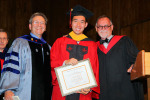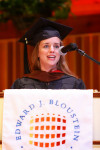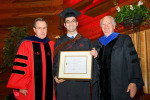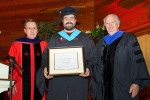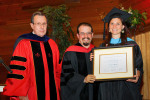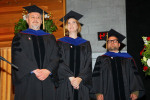UNDERGRADUATE CONVOCATION
As part of Rutgers University’s 247th anniversary commencement ceremonies, the Bloustein School held its first-ever undergraduate convocation ceremony for public health and planning & public policy majors on Thursday, May 16. In its largest undergraduate class to date (271 students), 26 students were awarded Bachelor of Arts in Planning and Public Policy degrees, and 245 students were granted Bachelor of Science in Public Health degrees.
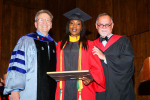
Saundra Session receiving the Sydney and Mildred Greenberg Award with Professors Nelessen and Greenberg
The ceremony, held at the neighboring State Theatre on Livingston Avenue, also recognized several outstanding students. Professor Tony Nelessen, director of undergraduate programs and professor Michael Greenberg, associate dean of the faculty, presented awards for academic excellence. Saundra Session, a public health undergraduate, received the Sydney and Mildred Greenberg Award for attaining the highest scholastic honors in the Bloustein School. Michael Wong, also a public health major and president of the Bloustein Public Service Association, was presented with the Miriam Barker Award for exceptional academic and community service achievement and contributions to the greater good.
Steven Liga, CEO & Executive Director of the National Council on Alcoholism and Drug Dependence of Middlesex County, Inc. was presented this year’s Part-Time Lecturer Award for his long-time service to the Bloustein School. Through his efforts, the School was able to develop the courses needed to meet the curricular requirements set by the State of New Jersey for issuing the Addictions Prevention Certificate. Professor Dona Schneider, Associate Dean for Academic Programs, presented the award.
Michael Wong spoke on behalf of his fellow graduates. “We are here today because we’ve made it,” he said. “In our time here at Rutgers, we have all discovered our passions, expanded our knowledge, built on our skill sets, and made lifelong friends. What brings us all together today is that fact that we all found our home within Rutgers at the Bloustein School. It didn’t take me long to realize why. As a graduating class, we all have one thing in common, a philosophy that guides our everyday actions. It is our aligned passion in building the future. That is what I believe the Bloustein School stands for.”
He encouraged his fellow public health majors to move on and change the world by applying their knowledge and work toward eliminating malaria in third world countries, make healthcare more accessible and affordable for millions of Americans, or to find and implement a cure for cancer. To his planning and public policy colleagues, he challenged them to build the future by designing the cities of the future to be more sustainable, working to improve infrastructure to better withstand natural disasters, and with governments on public policy to help make the world a more efficient and equitable place.
Bloustein Dean James W. Hughes conferred all degrees.
GRADUATE CONVOCATION
On Saturday, May 18 Dean Hughes presided over the Bloustein School’s tenth convocation of the graduate program, conferring 74 Master of City and Regional Planning (MCRP) degrees, two Master of City and Regional Studies (MCRS) degrees, 20 Master of Public Policy (MPP) degrees, eight Master of Public Affairs and Politics (MPAP) degrees, and four Doctor of Philosophy (Ph.D) in Planning and Public Policy degrees.
Dr. Hughes introduced guest speaker James G. Bach, a 1975 alumnus and MCRP degree recipient and Chief Operating Officer of The Louis Berger Group, Inc. While explaining that this was his first attendance at both a Rutgers and Bloustein convocation ceremony, Mr. Bach noted his—and The Berger Group’s—long-time association and commitment with the Bloustein School.
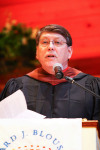
James G. Bach, MCRP ’75, speaks at graduate convocation
During his 38 years as a planner, Mr. Bach has spent the last 30 years with The Berger Group. His entire career was spent working alongside graduates of Rutgers’—and later the Bloustein Schools’—MCRP graduates.
“And along the way, there are some things that I’ve learned which I would like to share with you,” said Mr. Bach. “You are graduating from one of the finest educational programs in the country—be proud. Be an optimist…remember the end-user in everything you do.” He also went on to encourage the graduates to keep abreast of changing technology, noting that we are all being asked to do more with less and that staying both flexible in expectations as well as passionate about the job you are doing are the keys to success.
“Stay connected and stay current,” he concluded. “The Bloustein School is a source of knowledge and contacts and continuing education credits…along with the superior education comes an obligation to take the tools you have been given and use them to make this world a better place.”

Sabeen Kalyan Masih Speaking at 2013 Graduate Convocation Ceremony
Sabeen Kalyan Masih spoke on behalf of the public policy graduates. Bloustein became a “home away from home,” she said, providing students with a safe haven of professors who became mentors and fellow students who became family. In addition to knowledge, every student began to understand who they were and gained the ability to think and challenge themselves daily.
“Bloustein has shaped us into individuals who are ready to out into the real world,” she concluded. “Each of us came here with a desire to change the world. But now as we leave, we now have the tools and knowledge of how to change the world.”
Eleanor Wendell was invited to speak for her fellow urban planning colleagues. She began by recounting some memorable activities that occurred during her time at the school, noting that within those memories was the moment she realized how fortunate she was to be at Bloustein.
“Beyond the individual moments, I am most appreciative that our time at Bloustein reminds us to do three things to cultivate our evolving professional and personal excellence,” she said. “The first is to create—we are active participants in our education … the second is to collaborate—we are encouraged to identify each other as resources and to be generous with our own capabilities … the third is to pursue potential—Bloustein doesn’t breed one version of success, but encourages each of us to develop our own unique brand. Whatever our story, each of us is poised to thrive.”
Special awards were also presented by Professor Robert Burchell, Director of the Urban Planning Program and Professor Stuart Shapiro, Director of the Public Policy Program, as follows:
American Institute of Certified Planners Outstanding Student Planner Award: Scott Fishberg.
Presented to a student in the planning program in recognition of his or her outstanding academic and professional excellence and attainment in the study of planning.
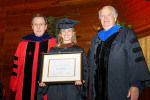
Eleanor Wendell with Dean Hughes and Professor Burchell
Outstanding Student Academic Achievement Award, Urban Planning: Eleanor Wendell
Given to the student who has been designated by the faculty for the highest academic excellence in the urban planning and policy development program.
Outstanding Student Service Award, Urban Planning: Jorge Santos
—Given to a student, selected by nomination, providing the highest level of service to his/her community in the school and at large while a student in the urban planning and policy development program.
Outstanding Student Academic Achievement Award, Public Policy: Cecilia Kaltz
Given to the student who has been designated by the faculty for the highest academic excellence in the public policy program.
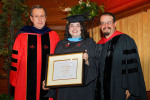
Dean Hughes and Professor Shapiro with Outstanding Student Service Award, Public Policy recipient Marie Virella
Outstanding Student Service Award, Public Policy: Marie Virella
Given to a student, selected by nomination, providing the highest level of service to his/her community in the school and at large while a student in the public policy program.
The Bloustein School is also responsible for administering the doctoral program in Planning and Public Policy for the Graduate School – New Brunswick, which awards the Ph.D. degree. Professor Robert Lake, Director of the Doctoral Program presented the three individuals in attendance that successfully completed their doctoral dissertations. Those individuals were:
Steve Dixon: “Publicly Owned Single Purpose Stadiums and Multipurpose Arenas: A Comparative Analysis of Economic Characteristics and Use Diversity”
Dissertation Chair: David Listokin
Leah Yasenchak: “The Ubiquitous Brownfield: Abandoned Gas Stations and their Social, Economic, and Environmental Implications”
Dissertation Chair: Michael Greenberg
Andrew Zitcer: “Honest Weights and Measures: Practicing Moral Consumption and Participatory Democracy in Urban Food Cooperatives”
Dissertation Chair: Robert Lake
Dr. Lake also presented Leah Yasenhchak and Andrew Zitcer the Susan S. Fainstein Distinguished Doctoral Scholarship Award. This special award recognizes those students whose dissertations demonstrate outstanding scholarship and excellence in doctoral research in the tradition established by former Bloustein School professor, Susan S. Fainstein.
Bloustein School alumni and their families are welcome to download and print photos from the Convocation ceremonies for personal use. The Bloustein School holds the copyright to all photos. Photos may not be used for any marketing or promotional purposes without the permission of the subject of the photo and the Bloustein School. Visit the Bloustein School website for links to the photos. Convocation videos will also be posted to this page when available.


